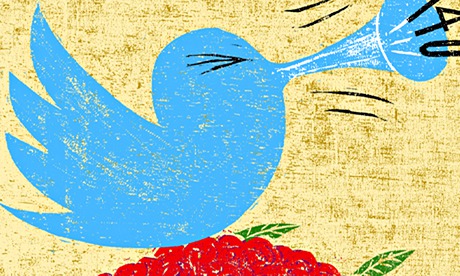http://www.independent.co.uk/voices/comment/bob-crow-death-this-trade-union-leader-was-different-rare-and-largely-misunderstood-9183783.html
Tony Benn, Bob Crow: the true mark of greatness is to avoid Twitter's death ritual
These Diana levels of praise were absurd. Today, with a limit of 140 characters, silliness and cant have gone nuclear

'Can you imagine what would have happened if Twitter had been around when John Lennon was shot?' Illustration by Daniel Pudles
By the end of last Tuesday, Bob Crow had turned into Princess Diana. To question his life and legacy was to come dangerously close to moral indecency – and anyway, who could argue that he was in fact a proud and principled example to us all?
"Bob Crow was a fighter and a force," said Nick Clegg. "Didn't always agree with him but he was a man of principle and said what he thought," reckoned Labour's Chuka Umunna, confirming the idea that politicians of his standing do actually think in cliches. "Bob Crow was a doughty and committed advocate for his members," offered the director general of the CBI, now a proud brother in struggle.
Boris Johnson said that Crow was "slightly misunderstood by the wider public, if I might say so", to which the obvious answer was: no, you might not. For London's mayor had not only long refused to meet the RMT leader, but only a month before rather encouraged the public to misunderstand him by making hay with Crow's supposedly hypocritical cruise trip and accusing him of "holding a gun" to the head of the capital?
Then came the death of Tony Benn, and true absurdity. First, a great line of modern Labour politicians hammering at their smartphones, 90% of whom embody – whether rightly or wrongly – a kind of progressive politics that has been washed of all traces of what Benn represented. "Tony Benn was a powerful, fearless, relentless advocate for social justice and people's rights," raved Gordon Brown, who reckoned he would "continue to have a profound influence on generations to come" (even though Benn once said Brown was "unfit to run a corner shop"). A few places back in the queue was Stephen Twigg, whose mercifully brief spell as shadow education secretary perhaps underlined the drawbacks of politics completely free of ideology. "Tony Benn was a true political giant – hearing him speak at a public meeting when I was 15 was what made me join the Labour party," he said. Really?
"The final corruption of radical politics is that you become a sort of well-loved eccentric, seen at parties," Benn wrote in his diaries. Posthumously, his worst fears came true – as evidenced by additional tweeted tributes from such notables as Stephen Fry, Gary Lineker,Simon Pegg, and Arlene Phillips, who had lately seen him "walking around Belsize Park". Such is one of the more surreal aspects of modern discourse, which lends itself to an amusing parlour game. Take a random celeb and an equally random issue or news event, and you're off: who fancies Ken Hom's views on Scottish independence, or what Mick Hucknall makes of the fate of that Malaysian airliner?
Is the key difficulty here the medium or the message? In other words – quite apart from the fact that social media self-evidently encourages the madness of crowds – given that Twitter now sits at the heart of the modern death ritual, is the fact that the complexities of lives have to be squeezed into 140 characters the source of the problem? Or does the fact that so many people have embraced that means of communication reflect what little time human beings have for nuance and complexity anyway? Whatever, if we have always had a tendency to respond to others' passing with cant and silliness – don't speak ill of the dead, and all that – that variety of behaviour is now going nuclear.
Can you imagine what would have happened if Twitter was around when John Lennon was shot? What great blizzards of nonsense will eventually mark the deaths of Bob Dylan, Bill Clinton, John Major or David Bowie? And might it be the mark of true greatness to breathe your last and somehow escape all this, remaining as controversial in death as in life? That certainly applied to Margaret Thatcher. It will also surely be true of Arthur Scargill. And, come to think of it, Tony Blair.
Benn, it seems to me, was thoroughly decent, personable and sometimes inspirational, a man whose essential values were beyond reproach. Beyond that, ambivalence takes hold. He and his followers played much the biggest role in ensuring that the Labour party spent much of the Thatcher years in a mire of unelectability. He was no less capable than other politicians of shameless about-turns, as anyone who followed his volte-face on nuclear power would know.
Circa 1985, in holding fast to the old maxim "no enemies on the left" and supporting the presence of Trotskyist wreckers in the Labour party, he rather did my head in – because I was fighting a gaggle of them who had moved into my constituency, hell-bent on taking over an essentially meaningless little branch of the Labour Party Young Socialists by being as unpleasant to other people as possible. I could say more, but that's the basis of what flipped through my brain last Friday: 857 characters, which kind of makes my point.
On a different subject, it may be worth pointing out that though, as Ken Livingstone observed, Bob Crow did indeed ensure that tube drivers are the only well-paid working-class people in London, he paid far too little attention to modern trade unionism's most pressing task: the need to defy a stereotype of stubborn, intransigent white men, and present a slightly more sympathetic face to the world. Am I allowed to say that yet? Given that the most rousing lines in the Internationale include "Away with all your superstitions", I would hope so.
14 March 2014 Last updated at 10:25
Five lesser-spotted things Tony Benn gave the UK

Tony Benn was known for his radical politics, but his career left a legacy of uniquely British artefacts he helped develop, writes Jon Kelly.
1. British stamp design. As Postmaster General from 1964-6, the republican Benn wanted to permit the introduction of "non-traditional" designs - of landscapes, portraits of composers and so on - without the Queen's head, but he faced resistance from Buckingham Palace. The compromise that resulted from his campaign - a small cameo silhouette in the corner of pictorial stamps - can still be seen to this day.
2. The postcode system. Since the late 1950s, the Post Office had been trialling a method of six-digit alphanumeric codes to sort mail in the Norwich area. In October 1965, under Benn's watch as Postmaster General, the Post Office announced it would extend the system to the rest of the country. Benn also oversaw the opening of the Post Office Tower, now the BT Tower.
3. BBC Radio 1. Benn introduced the 1967 Marine Broadcasting Offences Act that closed down the pirate radio stations which were transmitting offshore around the coast of Britain. The legislation made it almost impossible for the likes of Radio Caroline to keep going and paved the way for the launch of Radio 1 in September of the same year.
4. E in Concorde. As minister of technology from 1966-70, Benn was responsible for the development of the Anglo-French supersonic airliner. Others can take credit for designing and building it, but Benn successfully resisted Treasury efforts to cancel it because of spiralling costs. He also restored the letter "e" to the project's name, which had been removed by former Prime Minister Harold Macmillan after a falling out with Charles de Gaulle. "E stands for excellence, for England, for Europe and for the entente cordiale," Benn said.
5. The rucksack with a built-in seat. Long a keen amateur inventor - he bolted a chair onto the roof of a car for his 1970 election campaign - Benn proudly showed off his creation, the "frontbencher", at the age of 83. "I was carrying around a stool and a rucksack and thought it would better if I put them together," he said. Less successful than his other innovations, he offered Sir Richard Branson the opportunity to manufacture it, but the tycoon turned him down.


No comments:
Post a Comment